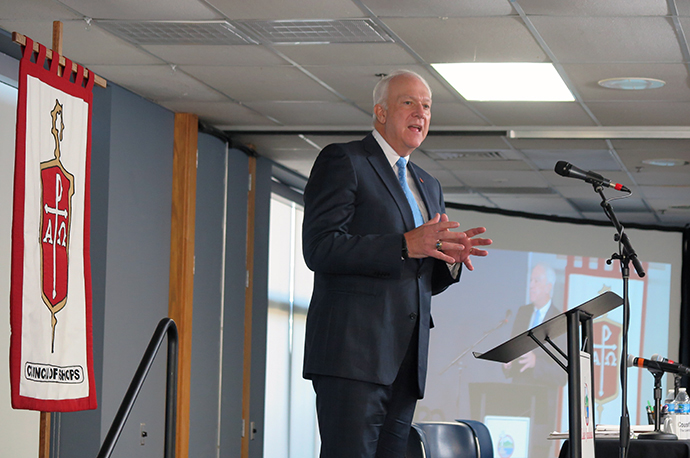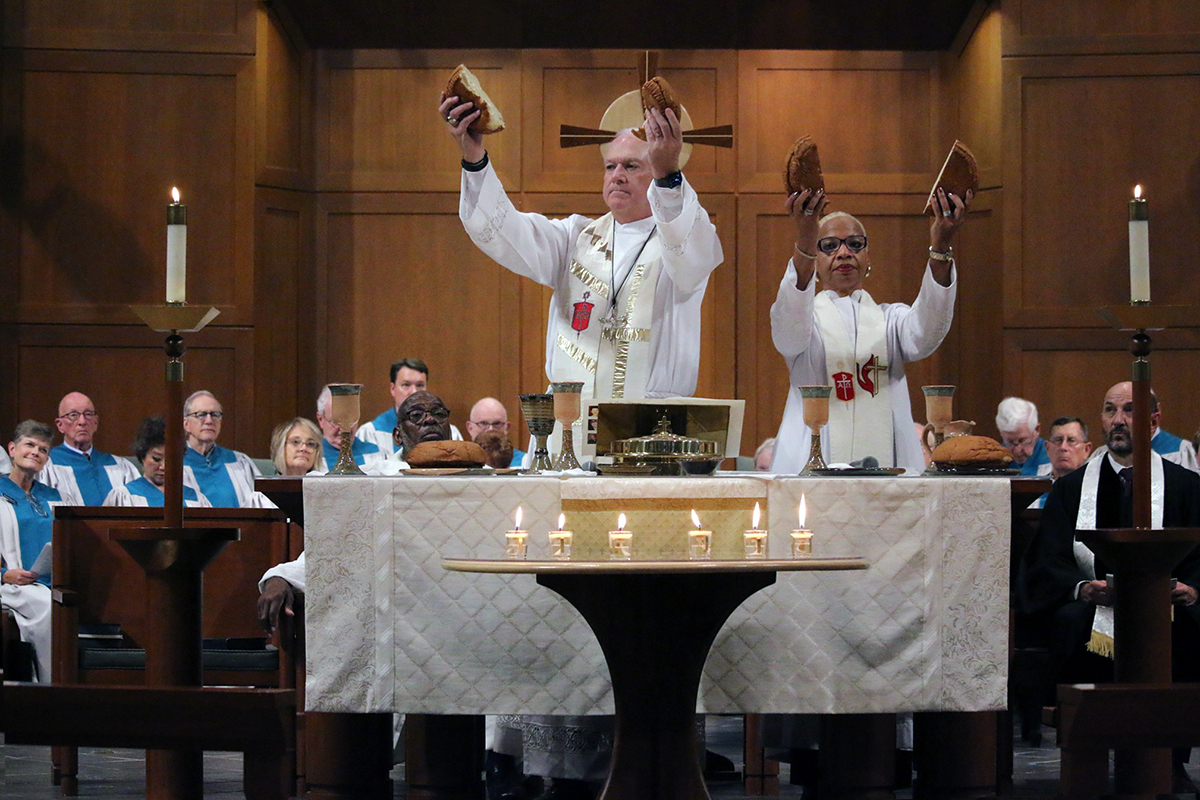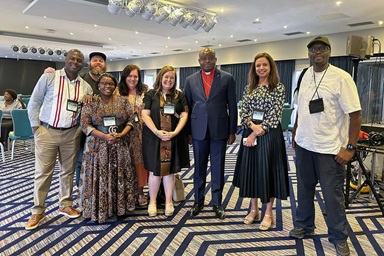Key points:
- United Methodist Council of Bishops President Thomas J. Bickerton urged his fellow bishops to use their woundedness to help bring healing.
- He preached at opening worship of the Council of Bishops fall meeting, where episcopal leaders will discuss the future of the church after a season that has seen thousands of U.S. churches exit.
- The meeting also will include strategizing for the coming General Conference, the denomination’s top lawmaking body at which bishops preside.
Nearing the end of a painful season, Council of Bishops President Thomas J. Bickerton urged his fellow bishops to use their woundedness to help The United Methodist Church heal.
“2023 has been a year when the climate of the world — a world filled with skepticism, distrust, anger and fear — has confronted our work and leadership at every turn,” Bickerton told more than 100 United Methodist bishops and other denominational leaders gathered from four continents for the fall meeting of the Council of Bishops.
However, Bickerton stressed during the Nov. 7 opening worship service that the experiences of the past year do not mean the end of The United Methodist Church or its mission to make disciples of Jesus Christ for the transformation of the world.
Bishops, he said, still have a needed voice in a broken world. He opened the day’s meeting by asking those gathered to pray for the people affected by wars raging around the world including in Ukraine and in Israel and Gaza.
“As bishops,” Bickerton said, “we must play our part in doing the absolute hard work of helping to craft a narrative about our sole aim to love God and love neighbor so deliberately that people will notice it and be transformed by it.”

The bishop, who also leads the New York Conference, spoke to church leaders who will discuss the denomination’s future this week even as they grieve the loss of congregations that have decided to pursue their future outside the United Methodist fold.
As of Nov. 6, nearly 6,800 U.S. congregations have cleared the necessary hurdles to disaffiliate under a provision that allows churches to leave with property if they meet certain financial and procedural obligations. That represents about 22% of U.S. congregations departing since the church law took effect in 2019.
About 15 of the 53 U.S. annual conferences — church regional bodies — have scheduled special sessions to take up more disaffiliation requests before the end of the year, when the church law expires.
The Council of Bishops also has seen five fellow bishops leave The United Methodist Church for the Global Methodist Church, a theologically conservative breakaway denomination that launched last year.
The bishops have dealt with other challenges in their midst. During the morning session, Bickerton officially welcomed back California-Nevada Conference Bishop Minerva G. Carcaño after her 18-month suspension from United Methodist ministry and subsequent acquittal at a church trial. After months of controversy around Carcaño’s suspension, a jury of 13 United Methodist clergy unanimously found her not guilty of violating church law.
In a sermon that drew heavily from Henri Nouwen’s “The Wounded Healer,” Bickerton described those gathered for the Nov. 6-11 Council of Bishops meeting as “the wounded ones.”
“We, like many of our pastors, have said goodbye to people who we once called colleagues and friends,” Bickerton acknowledged. “We are scarred and worn and, if we are honest, have days when we have wondered how much longer we could continue on the path that we are following.”
And yet, despite their pain, he said, United Methodist bishops are still here to plan next steps and how to lead a smaller denomination, but one where a clear majority of congregations and individuals have committed to remain. At the June gathering of the Texas Annual Conference — one of the hardest hit by disaffiliations — Bickerton said the mere mention of “The United Methodist Church” was enough to get people to applaud.
Bickerton urged his fellow bishops to have a similarly renewed spirit and resolve as they meet.
The bishops plan to spend this week strategizing for General Conference, the denomination’s top lawmaking assembly, scheduled to meet April 23-May 3 in Charlotte, North Carolina. Bishops preside at the assembly but do not have a vote during the proceedings.
Subscribe to our
e-newsletter
Bickerton cautioned that those gathered should not just wait to see what General Conference will do. He urged those gathered to work for an assembly focused more on reclaiming shared ministry than the rancor of the past.
“We cannot afford to go into another General Conference where the narrative is about our arguments, our disagreements and our division,” he said. “We cannot afford to walk into Charlotte continuing to talk about disaffiliation and separation.”
Many of the bishops hearing his message embraced Bickerton’s call to pivot from the pain of sad farewells to the renewed hope in what United Methodists can do together in Christ’s name.
Bishop David Graves, who leads both the Alabama-West Florida and South Georgia conferences, called the sermon “Holy Spirit-inspired.”
“We’ve got to move on,” Graves said, “because we’ve got to be about Kingdom building.”
Bishop Cynthia Moore-Koikoi, who leads the Western Pennsylvania Conference and co-leads the Susquehanna Conference with Bishop Sandra Steiner Ball, shared a similar sentiment.
“I thought it was a message of hope and healing so that we can move forward into the future, so we can clearly discern what God has for us and move,” she said.
The morning worship included not only Holy Communion but also a service of healing including anointing with oil.
At the start of his sermon, Bickerton spoke of the commitment he saw among Asian United Methodist missionaries he met last month during the United Methodist Board of Global Ministries meeting in Phnom Penh, Cambodia. They are among the 186 missionaries and 25 mission volunteers from 40 countries serving around the world.
These missionaries, Bickerton said, “are not waiting to see what happens at a General Conference or sitting by the wayside waiting for a position paper on bringing relevancy back to a distressed denomination.”
He said these 21st-century mission servants each have their own story of pain, alienation and harm. But those experiences are helping them to connect effectively with other people.
As a result of their ministry, he said, lives are being touched and regions transformed.
“The United Methodist Church is thriving in ways that we are only imagining,” he said.
He concluded his sermon urging his fellow United Methodists to keep the ministry going.
“I pray that we will not harden our hearts,” Bickerton said, “and instead find meaningful ways to sing a joyful song that acknowledges the reality that in the midst of all we are facing, God will provide a way for us to keep the message and the story going.”
Hahn is assistant news editor for UM News. Contact her at (615) 742-5470 or newsdesk@umcom.org. To read more United Methodist news, subscribe to the free Daily or Friday Digests.




